Penarddun is a figure in Welsh mythology, the wife of Llŷr. The Second Branch of the Mabinogi names Bran, Branwen, and Manawydan as her children by Llŷr, and ascribes to her two additional sons by Euroswydd: Nisien, a good man, and Efnysien, a conniving troublemaker. The Welsh Triads call Llŷr one of the Three Exalted Prisoners of Britain for his captivity at Euroswydd's hands; this likely refers to a lost tradition of the birth of Penarddun's younger sons. The Mabinogi names Penarddun as a daughter of the ancestor Beli Mawr, but the genealogy is confused; it is possible she was meant to be his sister rather than daughter.
Euroswydd is a figure in Welsh mythology, the father of Nisien and Efnysien by Penarddun, daughter of Beli Mawr. In the Second Branch of the Mabinogi Penarddun is married to Llŷr, by whom her children are Brân, Branwen, and Manawydan. The circumstances of Nisien and Efnysien's conception are not described, but one of the Welsh Triads mentions that Euroswydd had held Llŷr captive as one of the Three Exalted Prisoners of the Island of Britain; it is likely the traditions are connected.

Beli Mawr was an ancestor figure in Middle Welsh literature and genealogies. He is the father of Cassivellaunus, Arianrhod, Lludd Llaw Eraint, Llefelys, and Afallach. In certain medieval genealogies, he is listed as the son or husband of Anna, cousin of Mary, mother of Jesus. According to the Welsh Triads, Beli and Dôn were the parents of Arianrhod, but the mother of Beli's other children—and the father of Dôn's other children—is not mentioned in the medieval Welsh literature. Several royal lines in medieval Wales traced their ancestry to Beli. The Mabinogi names Penarddun as a daughter of Beli Mawr, but the genealogy is confused; it is possible she was meant to be his sister rather than daughter.
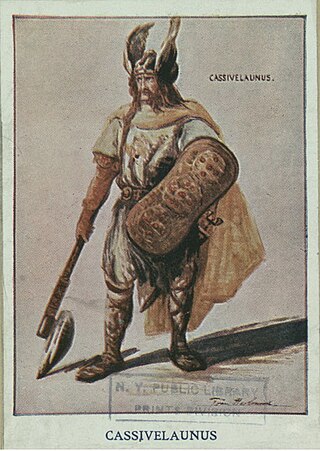
Cassivellaunus was a historical British military leader who led the defence against Julius Caesar's second expedition to Britain in 54 BC. He led an alliance of tribes against Roman forces, but eventually surrendered after his location was revealed to Julius Caesar by defeated Britons.
The Thirteen Treasures of the Island of Britain are a series of items in late-medieval Welsh tradition. Lists of the items appear in texts dating to the 15th and 16th centuries. The number of treasures is always given as thirteen, but some later versions list different items, replacing or combining entries to maintain the number.
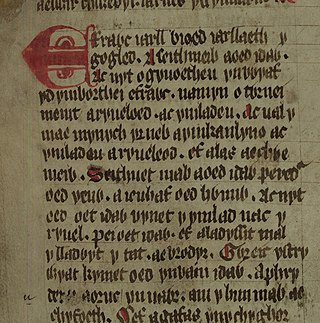
Peredur is the name of a number of men from the boundaries of history and legend in sub-Roman Britain. The Peredur who is most familiar to a modern audience is the character who made his entrance as a knight in the Arthurian world of Middle Welsh prose literature.

The Welsh Triads are a group of related texts in medieval manuscripts which preserve fragments of Welsh folklore, mythology and traditional history in groups of three. The triad is a rhetorical form whereby objects are grouped together in threes, with a heading indicating the point of likeness; for example, "Three things not easily restrained, the flow of a torrent, the flight of an arrow, and the tongue of a fool."
Morfydd ferch Urien is a figure of Welsh Arthurian legend. She is the daughter of Urien Rheged by Modron, and twin sister to Owain. Morfydd appears in the Welsh Triads and is also referred to in Culhwch and Olwen. The enduring love between her and Cynon son of Clydno, one of Arthur's warriors, is remarked on in several of the Triads, pointing to a now lost popular tradition.
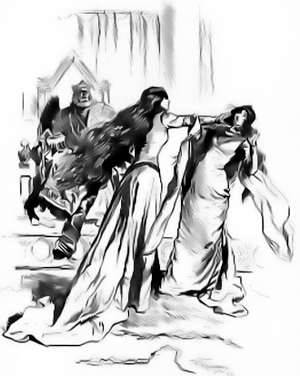
Gwenhwyfach was a sister of Gwenhwyfar (Guinevere) in medieval Welsh Arthurian legend. The tradition surrounding her is preserved in fragmentary form in two Welsh Triads and the Mabinogi tale of Culhwch and Olwen.
Llŷr is a figure in Welsh mythology, probably originally a deity, probably derived from Irish Ler, father of Manannán mac Lir. Other than his progeny and odd tidbits, his identity remains obscure.
Celliwig, Kelliwic or Gelliwic is perhaps the earliest named location for the court of King Arthur. It may be translated as 'forest grove'.
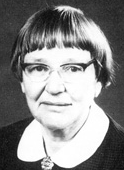
Rachel Bromwich born Rachel Sheldon Amos, was a British scholar. Her focus was on medieval Welsh literature, and she taught Celtic Languages and Literature in the Department of Anglo-Saxon, Norse and Celtic at the University of Cambridge, from 1945 to 1976. Among her most important contributions to the study of Welsh literature is Trioedd Ynys Prydein, her edition of the Welsh Triads.
Sanddef Pryd Angel is a figure of Welsh tradition. He usually figures as a warrior of King Arthur's court, and is distinguished by his great beauty, which gives him his epithet Pryd or Bryd Angel.
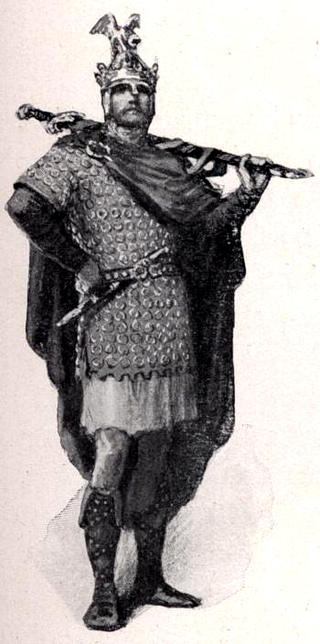
King Arthur's family grew throughout the centuries with King Arthur's legend. Many of the legendary members of this mythical king's family became leading characters of mythical tales in their own right.
Talhaearn Tad Awen, was, according to medieval Welsh sources, a celebrated British poet of the sub-Roman period. He ranks as one of the earliest, if not the earliest, named poets to have composed and performed in Welsh. The better known poets Aneirin and Taliesin, who may have been slightly younger contemporaries, also belong to this early generation, the first of those known to modern scholars as the Cynfeirdd. Whereas medieval Welsh manuscripts preserve verse composed by or otherwise ascribed to the latter two figures, no such work survives for Talhaearn and in fact, his former fame seems to have largely vanished by the later Middle Ages.
In Welsh tradition, Hueil mab Caw was a Pictish warrior and traditional rival of King Arthur's. He was one of the numerous sons of Caw of Prydyn and brother to Saint Gildas.
Drudwas ap Tryffin is a knight of King Arthur's court in early Arthurian mythology and the owner of the magical Adar Llwch Gwin. His father, Tryffin, is described as the king of Denmark, while his sister, Erdudwyl, was, according to The Death of Drudwas, supposedly a “mistress” of Arthur.
According to Welsh tradition, Afaon fab Taliesin was the son of the bard Taliesin and a member of King Arthur's retinue. He appears both in the Welsh Triads and in the medieval Arthurian tale Breuddwyd Rhonabwy.
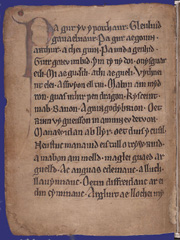
Poem 31 of the Black Book of Carmarthen, a mid-13th century manuscript, is known from its first line as Pa gur yv y porthaur? or Pa gur, or alternatively as Ymddiddan Arthur a Glewlwyd Gafaelfawr. It is a fragmentary, anonymous poem in Old Welsh, taking the form of a dialogue between King Arthur and the gatekeeper Glewlwyd Gafaelfawr, in which Arthur boasts of his own exploits and those of his companions, especially Cai the Fair. Pa gur is notable for being one of the earliest vernacular Arthurian works, and for alluding to several early adventures of Arthur which are now lost. Its precise age is not known and has been the subject of wide-ranging disagreement, but scholarly opinion now tends to favour a date of c. 1100.
Rhongomyniad, or Rhongomiant, was the spear of King Arthur in the Welsh Arthurian legends. Unlike Arthur’s two other weapons, his sword Caledfwlch and his dagger Carnwennan, Rhongomyniad has no apparent magical powers.